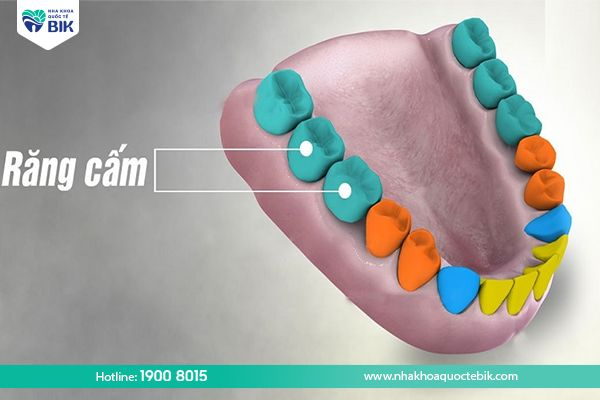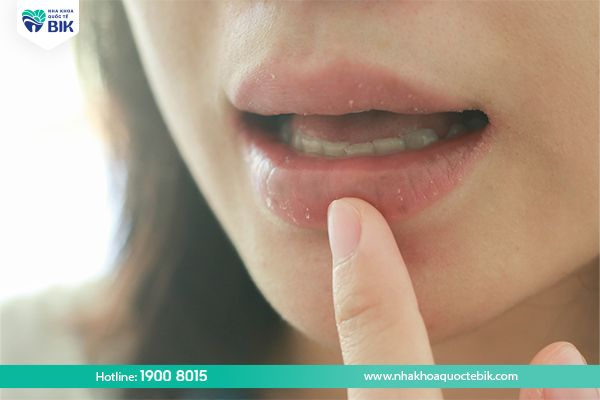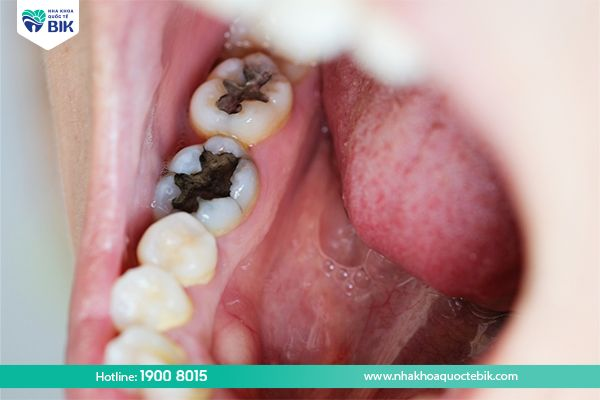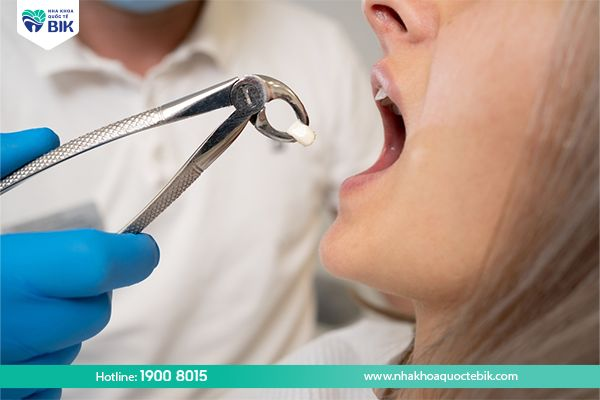It can be said that any tooth on the jaw can be decayed, but if you pay attention, molars and other molars are the teeth with the highest risk of decay. The reason is because they are located deep inside and have a surface with many bumpy grooves, so food plaque is often not completely cleaned. So what to do if molars are severely decayed? Let’s find out with BIK International Dental Clinic in the following article!
1. Where are molars located on the jaw?
Molars belong to the group of large molars and are tooth number 6 in the jaw, also known as molars, with a wide chewing surface and a large tooth body. Molars usually grow permanently between the ages of 6 and 8. Teeth number 6 and tooth number 7 are the two teeth that hold the main chewing function among all teeth.
In particular, this tooth has a close connection with the maxillary sinus nerve system, so this tooth is always protected to the maximum and should not be removed arbitrarily. The reason is because this tooth is responsible for the main chewing function in the jaw, so when removed, the ability to chew will be reduced. In addition, this tooth is also a support for other teeth to grow firmly, avoiding the situation of misaligned teeth causing harm later.

2. Causes of molar decay
Molar decay can be due to the following causes:
2.1. Improper oral hygiene
Tooth decay in particular and oral problems in general are often caused by improper oral hygiene. Patients who brush their teeth cause food plaque to accumulate in the oral cavity for a long time, gradually forming tartar. This is a favorable environment for bacteria to grow and attack and destroy tooth enamel, causing tooth decay.

2.2. Diet
Regularly consuming foods high in sugar or starch is also a common cause of tooth decay. The reason is that these substances are easily metabolized in the oral cavity, creating conditions for bacteria to grow and damage tooth enamel. In addition, eating foods that contain a lot of spices, acids, flavorings, preservatives, etc. will also change the environment in the oral cavity, gradually weakening tooth enamel.
2.3. Effects of gastric reflux
Gastroesophageal reflux is characterized by reflux into the esophagus. If prolonged, it can cause the physiological environment in the oral cavity to lose its stability, causing harmful bacteria to thrive and cause demineralization and tooth decay. In addition, people with gastric reflux are also at higher risk of other oral diseases than normal people.
2.4. Dry mouth
In addition to softening food and keeping the oral cavity warm, saliva also plays an important role in providing essential nutrients for teeth, while inhibiting the growth of harmful bacteria. Therefore, if you do not drink water regularly or smoke too much, causing your mouth to become dry, it can cause molars to decay.

3. Why molars are prone to severe decay
Tooth decay is a disease that can originate from any tooth on the jaw, but molars and premolars will have a higher level of decay. Molars are one of the teeth that play a particularly important role among all the teeth on the jaw and this is also the tooth that is most susceptible to cavities for the following reasons:
– Due to the position of the teeth growing at the back of the jaw, oral hygiene is difficult. Food debris can easily get stuck between the teeth and on the surface if not cleaned thoroughly.
– Due to a diet containing a lot of sugar and foods that are not good for oral health such as candy, carbonated soft drinks, etc.
– Due to improper oral hygiene, not all food residue and remaining debris are cleaned.

4. What to do if molars have severe decay?
Usually, preserving real teeth as much as possible is the most important principle for every dental treatment. The reason is that if any tooth on the jaw is lost, it will also lead to misalignment of adjacent teeth. In addition, jaw bone loss that occurs after tooth loss is also very dangerous, affecting the ability to chew, causing the face to show signs of aging and become older than its age.
However, in the case of a severely decayed molar, the decay has spread to the pulp, destroying all the pulp tissue and making it impossible to recover, the doctor must prescribe the extraction of the decayed molar. Keeping the severely decayed molar at this time is of no benefit because the pulp has been destroyed, the tooth is considered dead and can no longer function or exist normally. Extracting a severely decayed molar is to ensure oral health and prevent the decay from spreading to the remaining teeth.

Determining whether a molar with cavities should be extracted or not will depend on the initial general examination as well as your X-ray results. The doctor will need to analyze the location, shape and condition of the decayed tooth, see if the tooth has penetrated the root of another tooth or is related to the nerve or not to have the most appropriate treatment direction.
After extracting a severely decayed molar, you should consider having an implant to restore the lost tooth quickly and effectively. Implants can completely replace damaged real teeth from the root to the crown, ensuring complete restoration of aesthetics as well as normal chewing function. In addition, this method also helps you avoid the situation of misaligned teeth and jawbone atrophy after a period of tooth loss.
5. Is it dangerous to extract a severely decayed molar?
When a molar is so badly decayed that it cannot be preserved, the doctor will extract the tooth to avoid affecting the alveolar bone and adjacent teeth. After the tooth is extracted, the gum will be sutured with self-dissolving thread and the wound will heal quickly after only a few weeks. At this time, you can eat and chew normally, but you need to pay attention to oral hygiene to avoid infection of the gum area.
Before extracting a molar, the patient will be injected with a local anesthetic, so there will be absolutely no pain or discomfort throughout the extraction process. Whether you feel too much pain or not after the anesthetic wears off depends largely on the doctor’s skills. If the doctor is highly skilled and experienced, he or she will know how to minimize the pain for the patient.

After extracting a severely decayed molar, you should get an implant as soon as possible to avoid dangerous complications caused by tooth loss.
So what to do with a severely decayed molar, whether or not it is necessary to extract the tooth depends on the doctor’s decision. The doctor will rely on the results of the X-ray as well as the specific oral condition to come up with the best treatment plan, bringing high efficiency and ensuring safety for the patient.


















